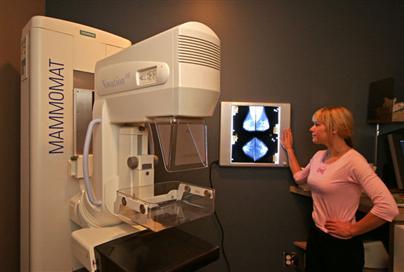


Mammography technologist, studies x-rays from a mammogram at Victoria General Hospital in this 2005 file photo.
When a relative convinced Rena Bramson last year to get tested for genetic mutations that can dramatically increase the risk of certain cancers among Ashkenazi Jewish women like her, she worried little about the results. After all, there was no apparent history of the disease in the Toronto resident's family.
Then came the call from Women's College Hospital a few months later: the 39-year-old had a BRCA-2 mutation, meaning she had a one in two lifetime chance of getting breast cancer, and one in four of ovarian cancer.
"It literally felt like my blood ran cold," she recalled. "I was thinking ‘This can't be, I don't have this in my family.' ... Here was this bullet coming straight at me and I had no idea."
Within months, Ms. Bramson had undergone operations to remove her uterus and ovaries, followed by a double mastectomy and breast reconstruction, a preventive surgical ordeal that now all but shields her from the two cancers.
Yet the mother of an 11-year-old son and eight-year-old daughter would never have been screened for the mutation had she not enrolled in a special study at the hospital. Only Jewish women who have had cancer themselves or cancer in their close family are eligible for genetic testing under the rules followed by most provinces. In fact, the Toronto study of 2,000 Jewish women found that more than half of those who tested positive for one of three cancer gene mutations would normally -- like Ms. Bramson -- not have qualified for screening.
Taken aback by that finding, the doctors leading the study are now suggesting that all Jewish women be given government-funded genetic testing, which can trigger preventive measures or early detection of cancer.
"We were shocked," said Dr. Kelly Metcalfe, a scientist at Women's College.
It has long been known that Ashkenazi Jews -- those originating from Germany and eastern Europe -- are much more likely than most women to have genetic abnormalities that increase their risk of breast and ovarian cancer.
Dr. Metcalfe, Dr. Steven Narod and others at Women's College set out to try to accurately pinpoint the prevalence of the mutations, inviting women to come forward through a newspaper article. They found that 23 -- just over one in 100 -- had one of the abnormalities.
What surprised everyone is the lack of family history of cancer among many of those who tested positive.
One geneticist not involved in the research, though, urged caution before reading too much into the findings. While many women with no family history of cancer may have one of the BRCA mutations, it is possible they are still at much less risk of disease than women with both the mutation and the family history, said Dr. Ab Chudley, a University of Manitoba professor.
"To offer it to everybody, the jury is still out on that, particularly with limited resources," he said. "There are a lot of things we could be testing for. This is just the tip of the iceberg."
Other types of cancer screening have triggered controversy lately, with some experts suggesting technology like mammograms and prostate PSA exams can lead to unnecessary treatment if offered too indiscriminately. The genetic testing of Jewish women, however, is a different matter, argued Dr. Metcalfe.
One of the mutations gives women as much as an 80% chance of getting breast cancer and 50% of ovarian cancer. And yet, a positive test can lead to potentially life-saving preventive action, she said.
Women have the choice of taking the drug Tamoxifen, having surgery to remove breasts and ovaries, or undergoing intensive cancer screening designed to catch the disease early, making treatment more likely to succeed.
Given the costs of therapy for cancer patients, making the genetic testing more widely available among Jews would likely save money, said Dr. Metcalfe. The Women's College lab can do the test for the three mutations for $25.
Dr. Chudley, however, notes that the costs of providing preventive treatment to women who have the mutation can be steep, so the economics should be carefully considered.
In the meantime, the Toronto hospital is expanding the study so another 5,000 can be screened. There are about 170,000 Jewish girls and women in Canada.
Ms. Bramson said she was "beyond grateful" for the opportunity to get her test, especially after receiving some chilling news from a surgeon. Examination of the excised tissue indicated she would likely have had breast cancer within five years.
Ms. Bramson also pressured others in her family to get screened. Her aunt, Judy Kowal, tested positive for one of the mutations, and subsequent examination revealed she already had stage-two ovarian cancer. Doctors figured Ms. Kowal would have been dead within a couple of months if they had not caught the cancer then, said the niece. After surgery and chemotherapy, she is now cancer free.
National Post - tblackwell@nationalpost.com






















